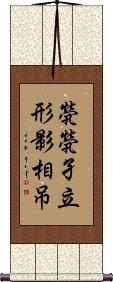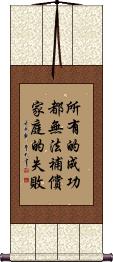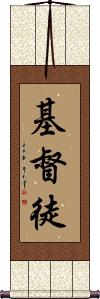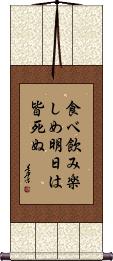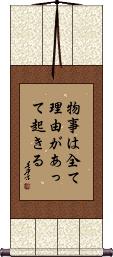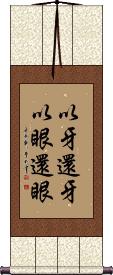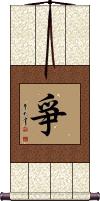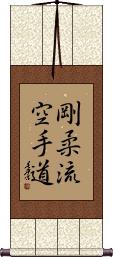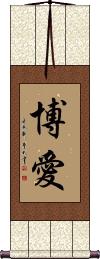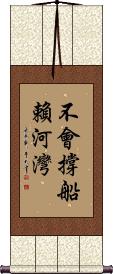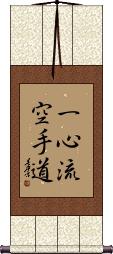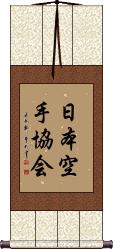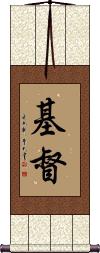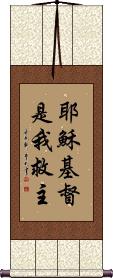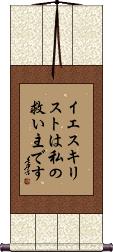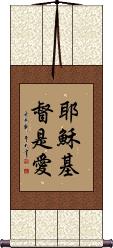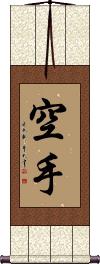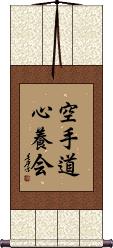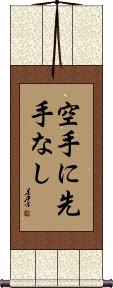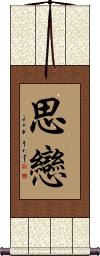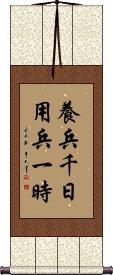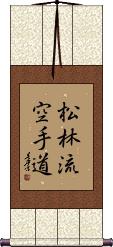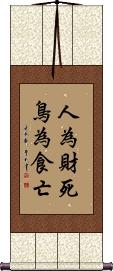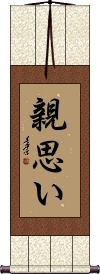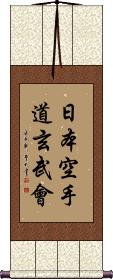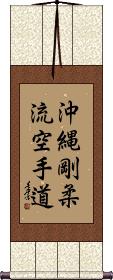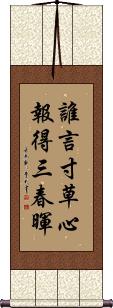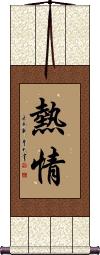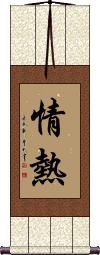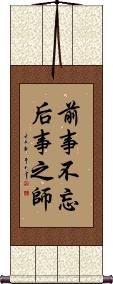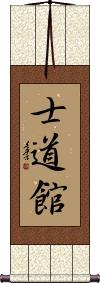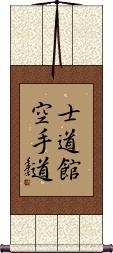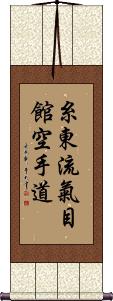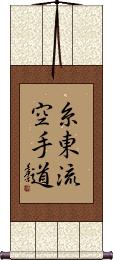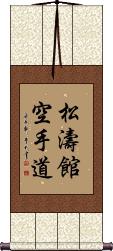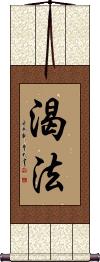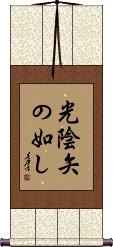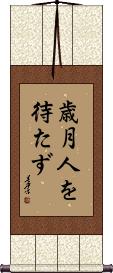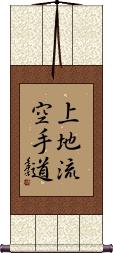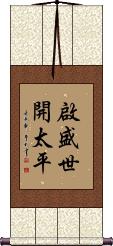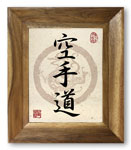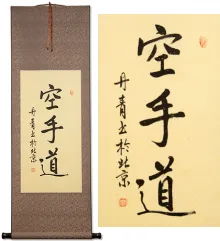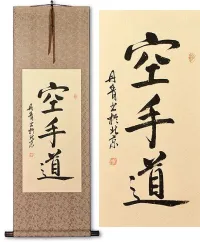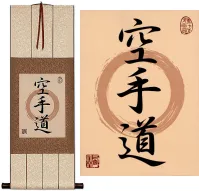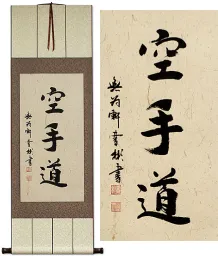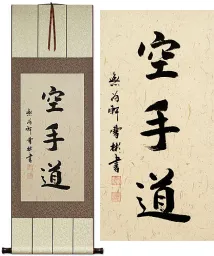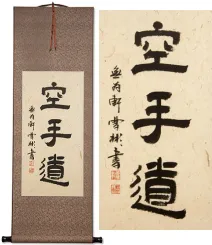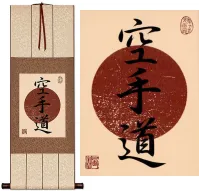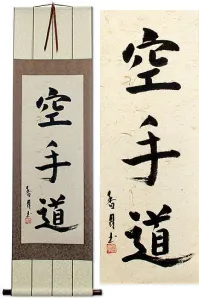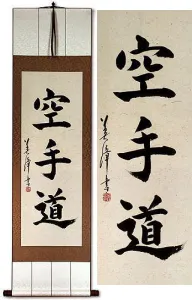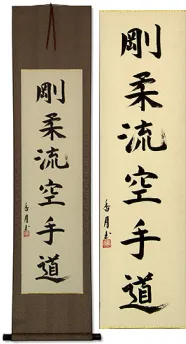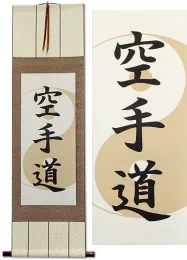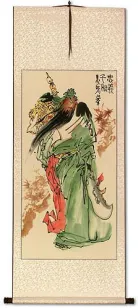Many custom options...
And formats...

The name Karate for Christ in Chinese / Japanese...
Buy a Karate for Christ calligraphy wall scroll here!
Personalize your custom “Karate for Christ” project by clicking the button next to your favorite “Karate for Christ” title below...
See also: Martial Arts Words and Phrases
Switched to secondary search mode due to lack of results using primary.
These secondary results may not be very accurate. Try a different but similar meaning word or phrase for better results. Or...
Look up Karate for Christ in my Japanese Kanji & Chinese Character Dictionary(My dictionary is a different system then the calligraphy search you just tried)
If you want a special phrase, word, title, name, or proverb, feel free to contact me, and I will translate your custom calligraphy idea for you.
1. Alone with only your shadow for company
2. Any success can not compensate for failure in the home
3. Christian / Disciple of Christ
6. Eat Drink and Be Merry, For Tomorrow We Die
7. Everything Happens for a Reason
9. Eye for an eye, tooth for a tooth
10. Fight for a Goal
11. Fighter for God
15. Love for Humanity / Brotherly Love
16. The incompetent boat pilot blames the river for his shortcomings
18. Japanese Karate Association
19. Christ
22. Jesus Christ
24. Kakuto Karate
25. Karate
26. Karate-Do
29. Kenka Karate
30. Kempo Karate / Law of the Fist Empty Hand
31. Law of the Fist Karate / Kempo Karate
32. Live For The Day
33. Live For The Day / Seize The Day
36. Maintain An Army For 1000 Days, Use It For An Hour
37. Matsubayashi-Ryu Karate-Do
38. Men Die for Wealth, Birds Die for Food
39. Love for Parents
40. Nippon Karate-Do Genbu-Kai
41. Okinawa Goju Ryu Karate-Do
42. Okinawa Karate
43. Appreciation and Love for Your Parents
45. Enthusiasm / Passion for a Cause
46. Past experience is the teacher for the future
47. Shidokan
49. Shito-Ryu Ki-Me-Kan Karate-Do
53. Always Striving for Inner Strength
54. Thirst for Truth
55. Time and Tide Wait for No Man
59. Wado-Ryu Karate
Alone with only your shadow for company
煢煢孑立形影相吊 is a Chinese proverb about the state of being as alone as you possibly can be.
It can be translated as “Alone with only your shadow for comfort/company.”
See Also: I Miss You
Any success can not compensate for failure in the home
Christian / Disciple of Christ
基督徒 is a very strong and direct word in Chinese for “Christian.”
The literal translation of the first two characters is “Christ.”
The last character means apprentice, follower, or disciple.
Altogether these three characters mean “Christ's Disciple” or “Christ's Apprentice.” 基督徒 is a pretty cool title to hang on your wall if you are a devout Christian.
Also used by Japanese Christians (but may be unfamiliar to non-Christian Japanese people).
See Also: Jesus Christ | God of Abraham
Danketsu Karate-Do
団結空手道 is the title for Danketsu Karate-Do, a dojo located in Stroudsburg, PA.
団結 (danketsu) means union, unity, or combination.
空手道 (karate-do) means “empty hand way.”
If you need you martial arts school/dojo/academy added to my database, just give me the info (actual Chinese/Japanese text if you have it).
Not Long for this World
This phrase means “Old and ailing with little time left” or “Not long for this world.”
There is a real suggestion here that someone will die soon.
This was added by a special request of a customer and is perhaps, not the most positive phrase that you could put on a wall scroll.
This would be the most offensive possible gift to give to an older person - please do not do that!
Eat Drink and Be Merry, For Tomorrow We Die
Everything Happens for a Reason
萬事皆因果 means “Everything happens for a reason” in Chinese.
The first two characters mean “all things” or “everything.”
The middle character kind of means “in all cases.”
The last two characters create a complex word that can be defined in many ways, such as “karma,” “cause and effect,” “fate,” and “every cause has its effect, as every effect arises from a cause.”
Keep in mind that Chinese grammar is a bit different than English, so trust me that this makes a natural-sounding proverb in Chinese.
Everything Happens for a Reason
物事は全て理由があって起きる means everything happens for a reason.
However, this is a work in progress. We're still trying to decide the best way to express this in Japanese. If you order this, we might have a discussion about the best version that fits you. Here's how the characters break down by meaning (keep in mind, Japanese grammar and sentence construction is very different from English, so it doesn't make complete sense in English)...
物事 = things, everything
は particle
全て all, the whole, entirely
理由 reason
が particle
あっ be, exist, have, take place, happens
て particle
起きる to occur, to happen; to take place (usually unfavorable incidents)
Note: Because this selection contains some special Japanese Hiragana characters, it should be written by a Japanese calligrapher.
Eye for an eye
Eye for an eye, tooth for a tooth
Here's the full proverb, 以牙还牙以眼还眼, with the first and second parts.
However, in Chinese, it's more natural to put the “tooth” part first, so this more accurately reads “Tooth for a tooth, eye for an eye.”
If revenge is important to you, I suppose this is the phase you want on your wall.
Fight for a Goal
爭 is the way to express the idea of fighting for a goal.
This can also mean struggling or arguing. 爭 is okay for a Chinese audience, and while it is a word in Korean, this character is seldom seen alone in Korean grammar.
Fighter for God
Flying Dragon Karate-Do
Goju Ryu Karate-Do
Honor for Ancestors
祖先崇拜 means “Appreciation and honor of your ancestors.”
This can refer to anyone from your grandparents and beyond.
The first two characters mean ancestors or forefathers.
The last two characters mean worship, adore/adoration, or admiration.
This is the kind of wall scroll that a filial son or daughter in China or Japan would hang to honor their ancestors who paved the way for the new generation.
![]() Japanese use a slight variation on the last Kanji. If you want this specifically Japanese version, just click on the Kanji image to the right (instead of the button above). Note that Japanese people would easily be able to identify the original Chinese form of that Kanji anyway.
Japanese use a slight variation on the last Kanji. If you want this specifically Japanese version, just click on the Kanji image to the right (instead of the button above). Note that Japanese people would easily be able to identify the original Chinese form of that Kanji anyway.
They also have a similar phrase in old Korean but the first two characters are reversed - just let me know if you want that version when you place your order.
Love for Humanity / Brotherly Love
benevolence, love
In Chinese and Korean, 博愛 means a universal fraternity, brotherhood, or universal love.
In Japanese, this means charity, benevolence, philanthropy, or love for humanity.
Please note these subtle differences and take that into account depending on your intended audience (Chinese, Korean or Japanese).
See Also: Benevolence | Altruism
The incompetent boat pilot blames the river for his shortcomings
Isshin Ryu Karate Do
一心流空手道 is the full title for Isshin-Ryu Karate-Do.
The literal meaning is “one heart method empty hand way.”
There are other ways to translate this, but if you are looking for this title, you already know that.
This would make a great wall scroll for your dojo or private studio if you study this form of Japanese (technically from Okinawa) Karate.
Because this is a specifically-Japanese title, I strongly recommend that you select our Japanese Master Calligrapher to create this artwork.
Japanese Karate Association
Christ
基督 is how to write “Christ” in Chinese characters, Korean Hanja, and Japanese Kanji.
This is the word used in the Chinese Union Bible (the only readily-available translation of the Bible into Chinese that I know of - published about 100 years ago). For Chinese Christians, this is the most common way to refer to Jesus Christ.
This is also the way that “Christ” is written in Japanese. But since the Japanese language is very flexible about the sounds that can be assigned to various Kanji, these characters have been assigned a pronunciation that sounds a lot like “Christ” or actually closer to the original “Christos.” In Japanese (if you don't know how the Romaji shown above in the gray box works), it sounds like “key ree sue toe” using English words/sounds. Say those four words fast, and you'll get it.
It should be noted that only Japanese Christians will be familiar with this word.
This is best defined, read, and understood with the characters together, but if you take this word for Christ apart, the first character means “fundamentals” or “foundation.” The second character can mean “leader” or “boss.”
Jesus Christ is my Savior
Jesus Christ is My Savior
Jesus Christ
Jesus Christ is Love
Kakuto Karate
Karate
空手 is the short and widely-used-in-English version of karate-do without the “do” or “dao” at the end.
Literal meaning: Empty Hand.
Karate-Do
The literal meaning of 空手道 is “empty hand method” or “empty hand way.”
Credit is given that karate started in China but migrated and became refined and vastly popular in Japan.
Karate is a martial art that uses no blades or weapons other than the “natural weapons” God gave to humans (fists and feet). The last character somehow became optional, but the meaning of that character is “method” or “the way” as in Taoism / Daoism.
Karate-Do reached Korea, where it is known as 공수도 which can be romanized as “Kong Soo Do” or “Gong Su Do.”
Karate-Do Shinyo-Kai
Karate Ni Sente Nashi
Kenka Karate
Kempo Karate / Law of the Fist Empty Hand
空手拳法 is the Kanji title for Kempo Karate.
The first two characters mean “karate” - technically they express “empty hand.”
The last two express “fist law” which is Romanized from Japanese as “Kenpo” or “Kempo.”
That “empty hand” translation can be understood better when you grasp the idea that karate is a martial art without weapons (other than the weapons organic to your body, such as your foot, hand, fist, etc). When you practice karate, you do so with empty hands (no weapons).
Note: There is also an antiquated way to write karate. It has the same pronunciation but a different first character which means “Tang” as in the Tang Dynasty. Some dojos use that form - let us know if you need that alternate form, and we'll add it.
Law of the Fist Karate / Kempo Karate
The first two characters mean “fist law” which is Romanized from Japanese as “Kenpo” or “Kempo.”
The last two are a secondary way to express “karate.”
Notes:
The more common way to express “karate” is literally “empty hand” (meaning “without weapons in your hand”). This version would be translated literally as “Tang hand” (as in the Tang Dynasty) or “China hand” (sometimes “Tang” means “China” in Japanese). Even though the character for “Tang” is used instead of “empty,” it's still pronounced “kara-te” in Japanese.
拳法唐手 is not commonly used in China - so please consider it to be a Japanese-only title.
Many Japanese people will say the last two Kanji are the old and antiquated way of saying Karate. This fact does not stop this title from existing, as these four characters are often seen in Kenpo / Kempo Dojos around the western world.
Live For The Day
活在今天 is not an eastern concept, so it does not translate into a phrase that seems natural on a wall scroll.
However, if this is your philosophy, the characters shown here do capture your idea of living for today or living in the moment. 活在今天 says “Live in today,” and they are grammatically correct in Chinese.
Note: This kind of makes sense in Korean Hanja but the grammar is Chinese, so it’s not that natural in Korean.
Live For The Day / Seize The Day
今を生きる is a Japanese phrase that can be translated as “live for the day,” “live for the moment,” “seize the day,” or “make the most of the present.”
You can think of this as the Japanese version of “Carpe Diem.”
Note: Because this selection contains some special Japanese Hiragana characters, it should be written by a Japanese calligrapher.
Live for What You Love
人生謳歌 means “live for what you love” in Japanese.
The first two characters mean “human life” or simply “living.” The last two characters mean “merit,” “prosperity,” or “what you enjoy.” This phrase can suggest working or staying busy for your own goals (in your career).
See Also: Prosperity
Longing for Lover
Nothing could be more true. When I was in the Marine Corps, we trained for years for combat that often lasts only hours.
養兵千日用兵一時 is a Chinese proverb that, also reminds me of a common phrase used in the military to describe combat: “Weeks of total boredom, punctuated with five minutes of sheer terror.”
This may have some roots in Sun Tzu's The Art of War. Though I can not find this passage in his writings.
On the subject of the Art of War, if you have a favorite passage, we can create a custom calligraphy scroll with that phrase.
Matsubayashi-Ryu Karate-Do
鬆林流空手道 is the Japanese title for the Matsubayashi-Ryu Karate-Do school of martial arts.
If directly translated, it means “Pine Forest Style Empty Hand Way.”
Notes:
1. 松林流 can be pronounced Matsubayashi-Ryū or Shōrin-Ryū. This can be confusing as Shōrin can also represent 少林 which refers to the Shaolin (little forest) style.
2. 松 can also be written in the traditional form of 鬆.
Men Die for Wealth, Birds Die for Food
人為財死鳥為食亡 is a Chinese proverb that literally states that human beings will die for riches, just as birds will for food.
Figuratively it means that man will do anything in his means to become rich. Personally, I think dying for food is a more noble cause.
Often translated as “Men die in pursuit of wealth, birds die in pursuit of food. The 人 in this proverb just means human, so “men” is a placeholder for human with that translation - an English language problem that we have no easy gender-neutral nouns.
This proverb is meant to serve as a warning about the follies of greed.
Love for Parents
Nippon Karate-Do Genbu-Kai
Japanese Genbu Karate Club
日本空手道玄武會 is the title for Nippon Karate-Do Genbu-Kai.
A Japanese karate association of the Genbu school.
Note that while this title does make perfect sense in Chinese, it is really a Japanese title. In fact, the first word is “Japanese/Japan.”
If you’d like your martial arts school, dojo or club added to our calligraphy database for easy ordering of a custom calligraphy wall scroll, just contact me.
Okinawa Goju Ryu Karate-Do
Okinawa Karate
Appreciation and Love for Your Parents
誰言寸草心報得三春暉 is the last line of a famous poem. It is perceived as a tribute or ode to your parents or mother from a child or children that have left home.
The poem was written by Meng Jiao during the Tang Dynasty (about 1200 years ago). The Chinese title is “You Zi Yin” which means “The Traveler's Recite.”
The last line as shown here speaks of the generous and warm spring sunlight which gives the grass far beyond what the little grass can could ever give back (except perhaps by showing its lovely green leaves and flourishing). The metaphor is that the sun is your mother or parents, and you are the grass. Your parents raise you and give you all the love and care you need to prepare you for the world. A debt that you can never repay, nor is repayment expected.
The first part of the poem (not written in the characters to the left) suggests that the thread in a loving mother's hands is the shirt of her traveling offspring. Vigorously sewing while wishing them to come back sooner than they left.
...This part is really hard to translate into English that makes any sense but maybe you get the idea. We are talking about a poem that is so old that many Chinese people would have trouble reading it (as if it was the King James Version of Chinese).
Passion for a Cause
Depending on the context, 熱情 can mean “cordial,” “enthusiastic,” “passionate,” or “passionately.”
This version is sometimes used in Japanese, but the character order is more common in Chinese and Korean Hanja. The meaning in Japanese for this Kanji order is ardor/ardour or zeal but rarely used in modern Japan. I suggest you choose a different version of “passion” if your audience is Japanese.
See Also: Persistence | Devotion | Tenacity | Commitment | Motivation
Enthusiasm / Passion for a Cause
情熱 is the Japanese word that means enthusiasm or “passion for a cause.”
In some contexts, this could mean being extremely fond of something or having a fondness for a cause or person.
Can also be translated as passion, zeal, ardor/ardour, or fervor.
Note: This word (or character order) is not natural in Chinese. However, a typical Chinese person can guess this is a Japanese or Korean word and understand the intended meaning. This selection is best if your audience is Japanese or old-school Korean.
See Also: Persistence | Devotion | Tenacity | Commitment | Motivation
Past experience is the teacher for the future
Past events not forgotten serve as teachers for later events.
The most literal translation to English of this ancient 前事不忘后事之师 Chinese proverb is:
“Past events not forgotten serve as teachers for later events.”
However, it's been translated several ways:
Don't forget past events, they can guide you in the future.
Benefit from past experience.
Past experience, if not forgotten, is a guide for the future.
Past calamity is my teacher.
A good memory for the past is a teacher for the future.
The remembrance of the past is the teacher of the future.
If one remembers the lessons of the past; They will serve as a guide to avoid mistakes in the future.
The origin:
This proverb comes from the 5th century B.C., just before the Warring States Period in the territory now known as China.
The head of the State of Jin, Zhi Bo, seized power in a coup. He did this with help from the armies of the State of Han and Wei. Instead of being grateful for the help from Han and Wei, he treacherously took the land of Han and Wei. Never satisfied, Zhi Bo employed the armies of Han and Wei to attack and seize the State of Zhao.
The king of Zhao took advice from his minister Zhang Mengtan and secretly contacted the Han and Wei armies to reverse their plans and attack the army of Zhi Bo instead. The plan was successful, and the State of Zhao was not only saved but was set to become a powerful kingdom in the region.
Zhang Mengtan immediately submitted his resignation to a confused king of Zhao. When asked why, Zhang Mengtan said, “I've done my duty to save my kingdom, but looking back at past experience, I know sovereign kings are never satisfied with the power or land at hand. They will join others and fight for more power and more land. I must learn from past experiences, as those experiences are the teachers of future events.”
The king could not dispute the logic in that statement and accepted Zhang Mengtan's resignation.
For generations, the State of Zhao continued to fight for power and land until finally defeated and decimated by the State of Qin (which led to the birth of the Qin Dynasty in 221 B.C.).
Shidokan (Karate)
Shidokan Karate-Do
Shito-Ryu Ki-Me-Kan Karate-Do
Shito-Ryu Karate-Do
Shotokan Karate-Do
鬆濤館空手道 art the Japanese Kanji that make up the title for Shotokan Karate.
This should be considered a Japanese-only title. It does make sense and is pronounceable in Chinese and Korean but only as a title for a building (perhaps a martial arts hall) surrounded by pine trees - followed by the characters for “The empty hand method” (kong shou dao / Karate-do). Also, the first two characters were simplified in both Japanese and Chinese. The third character was simplified in Chinese but not Japanese.
Upon request, we can offer the fully traditional Chinese version but be sure you know what you are asking for.
Note: This would be understood in Chinese and Korean Hanja by a person from those cultures familiar with martial arts and various schools of Japanese karate.
Snow Leopard Karate-Do
Always Striving for Inner Strength
自強不息 is a proverb or idiom that suggests that the pursuit of self-improvement is eternal. It can also be a suggestion to strive unremittingly in life.
The first two characters mean inner strength with the idea of self-improvement. The last two characters mean “never rest” or “striving without giving up.”
Some will translate these four characters as “Exert and strive hard without any let-up.”
Thirst for Truth
Time and Tide Wait for No Man
歲不我與 is a Chinese proverb that means is a way to express, “Time and tide wait for no man.”
The literal meaning of these Chinese characters is, “Years don't [for] oneself wait.” In more natural English, it's more like, “Years will pass by, with or without you.”
There is also an alternate version, 时不我待, which literally means “Time doesn't [for] oneself, wait.” In natural English, it's more like, “Time waits for no man.”
Time and Tide Wait for No Man
光陰矢の如し is a Japanese proverb that means “time flies like an arrow.” It's very similar to the English idiom, “time and tide wait for no man,” or “life is short.”
The Kanji breakdown:
光陰 = Time (the cycle of light and dark).
[and an]
矢 = Arrow
の = are
如し = Alike
Note: Because this selection contains some special Japanese Hiragana characters, it should be written by a Japanese calligrapher.
Time Waits For No One
歳月人を待たず is a Japanese idiom “Saigetsu hito o matazu” which means “Time waits for no one.”
Another way to put it is, “Time and tide stay for no man.”
Note: Because this selection contains some special Japanese Hiragana characters, it should be written by a Japanese calligrapher.
Tooth for a tooth
以牙還牙 is a phrase that often goes with “An eye for an eye,” even in Chinese. Revenge seems to cross all languages, cultures, and even species (animals are known to take revenge too).
If a Chinese person uses just one part of the full proverb, it will be this “tooth for a tooth” one. Although, we are more likely to say “eye for an eye” alone in English.
Chinese people may also read this with the meaning of “Bite me, and I will bite you back.” However, it literally means “tooth for a tooth” or “you take my tooth, I take yours.”
Uechi-Ryu Karate-Do
Wado-Ryu Karate
Warrior for Peace
和平武士 means “Warrior for Peace” (a warrior who fights for peace) in Chinese.
Note this is not the same thing as a “peaceful warrior.”
See Also: Peace
White Crane Karate
Work Unselfishly for the Common Good
克己奉公 is a Chinese proverb that is often used to express how one should act as a government official. Most of us wish our public officials would hold themselves to higher standards. I wish I could send this scroll, along with the meaning to every member of Congress, and the President (or if I was from the UK, all the members of Parliament, and the PM)
This can also mean: “Place Strict Standards on Oneself in Public Service.”
The story behind this ancient Chinese idiom:
Cai Zun was born in China a little over 2000 years ago. In 24 AD, he joined an uprising led by Liu Xiu, who later became the emperor of the Eastern Han Dynasty.
Later, the new emperor put Cai Zun in charge of the military court. Cai Zun exercised his power in strict accordance with military law, regardless of the offender's rank or background. He even ordered the execution of one of the emperor's close servants after the servant committed a serious crime.
Cai Zun led a simple life but put great demands on himself to do all things honorably. The emperor rewarded him for his honest character and honorable nature by promoting him to the rank of General and granting him the title of Marquis.
Whenever Cai Zun would receive an award, he would give credit to his men and share the reward with them.
Cai Zun was always praised by historians who found many examples of his selfless acts that served the public interest.
Sometime long ago in history, people began to refer to Cai Zun as “ke ji feng gong.”
See Also: Unselfish | Selflessness | Altruism
Worldwide Wish for Peace and Prosperity
啟盛世開太平 means “To bring flourishing peace and security to the world (our current era).”
It's a wish that a new door leading to peace and prosperity could be opened to mankind.
Character and word breakdown:
啟 to open; to start; to initiate; to enlighten or awaken.
盛世 a flourishing period; period of prosperity; a golden age.
開 to open; to start; to turn on.
太平 peace and security; peace and tranquility; peace; tranquility.
I don't like to do breakdowns like this, as the words altogether create their unique meaning (encompassed in the main title above).
This in-stock artwork might be what you are looking for, and ships right away...
Gallery Price: $90.00
Your Price: $49.88
Gallery Price: $90.00
Your Price: $49.88
Gallery Price: $200.00
Your Price: $118.88
Gallery Price: $340.00
Your Price: $188.77
Gallery Price: $180.00
Your Price: $99.88
Gallery Price: $103.00
Your Price: $56.88
Gallery Price: $200.00
Your Price: $88.88
The following table may be helpful for those studying Chinese or Japanese...
| Title | Characters | Romaji (Romanized Japanese) | Various forms of Romanized Chinese | |
| Alone with only your shadow for company | 煢煢孑立形影相吊 茕茕孑立形影相吊 | qióng qióng jié lì xíng yǐng xiāng diào qiong2 qiong2 jie2 li4 xing2 ying3 xiang1 diao4 qiong qiong jie li xing ying xiang diao | ch`iung ch`iung chieh li hsing ying hsiang tiao chiung chiung chieh li hsing ying hsiang tiao |
|
| Any success can not compensate for failure in the home | 所有的成功都無法補償家庭的失敗 所有的成功都无法补偿家庭的失败 | suǒ yǒu de chéng gōng dōu wú fǎ bǔ cháng jiā tíng de shī bài suo3 you3 de cheng2 gong1 dou1 wu2 fa3 bu3 chang2 jia1 ting2 de shi1 bai4 suo you de cheng gong dou wu fa bu chang jia ting de shi bai | so yu te ch`eng kung tou wu fa pu ch`ang chia t`ing te shih pai so yu te cheng kung tou wu fa pu chang chia ting te shih pai |
|
| Christian Disciple of Christ | 基督徒 | kirisuto | jī dū tú ji1 du1 tu2 ji du tu jidutu | chi tu t`u chitutu chi tu tu |
| Danketsu Karate-Do | 団結空手道 | dan ketsu kara te dou danketsukaratedou dan ketsu kara te do | ||
| Not Long for this World | 風燭殘年 风烛残年 | fēng zhú cán nián feng1 zhu2 can2 nian2 feng zhu can nian fengzhucannian | feng chu ts`an nien fengchutsannien feng chu tsan nien |
|
| Eat Drink and Be Merry, For Tomorrow We Die | 食べ飲み楽しめ明日は皆死ぬ | tabe nomi tanoshime ashita wa mina shinu | ||
| Everything Happens for a Reason | 萬事皆因果 万事皆因果 | wàn shì jiē yīn guǒ wan4 shi4 jie1 yin1 guo3 wan shi jie yin guo wanshijieyinguo | wan shih chieh yin kuo wanshihchiehyinkuo |
|
| Everything Happens for a Reason | 物事は全て理由があって起きる | monogoto ha subete riyuu ga at te okiru monogoto ha subete riyu ga at te okiru | ||
| Eye for an eye | 以眼還眼 以眼还眼 | yǐ yǎn huán yǎn yi3 yan3 huan2 yan3 yi yan huan yan yiyanhuanyan | i yen huan yen iyenhuanyen |
|
| Eye for an eye, tooth for a tooth | 以牙還牙以眼還眼 以牙还牙以眼还眼 | yǐ yá huán yá yǐ yǎn huán yǎn yi3 ya2 huan2 ya2 yi3 yan3 huan2 yan3 yi ya huan ya yi yan huan yan yiyahuanyayiyanhuanyan | i ya huan ya i yen huan yen iyahuanyaiyenhuanyen |
|
| Fight for a Goal | 爭 争 | zhēng / zheng1 / zheng | cheng | |
| Fighter for God | 上帝的鬥士 上帝的斗士 | shàng dì de dòu shì shang4 di4 de dou4 shi4 shang di de dou shi shangdidedoushi | shang ti te tou shih shangtitetoushih |
|
| Flying Dragon Karate-Do | 飛龍空手道 飞龙空手道 | hi ryuu kara te dou hiryuukaratedou hi ryu kara te do | fēi lóng kòng shǒu dào fei1 long2 kong4 shou3 dao4 fei long kong shou dao feilongkongshoudao | fei lung k`ung shou tao feilungkungshoutao fei lung kung shou tao |
| Goju Ryu Karate-Do | 剛柔流空手道 刚柔流空手道 | gou juu ryuu kara te dou goujuuryuukaratedou go ju ryu kara te do | ||
| Honor for Ancestors | 祖先崇拜 祖先崇拜 / 祖先崇拝 | so sen suu hai sosensuuhai so sen su hai | zǔ xiān chóng bài zu3 xian1 chong2 bai4 zu xian chong bai zuxianchongbai | tsu hsien ch`ung pai tsuhsienchungpai tsu hsien chung pai |
| Love for Humanity Brotherly Love | 博愛 博爱 | hakuai | bó ài / bo2 ai4 / bo ai / boai | po ai / poai |
| The incompetent boat pilot blames the river for his shortcomings | 不會撐船賴河灣 不会撑船赖河湾 | bù huì chēng chuán lài hé wān bu4 hui4 cheng1 chuan2 lai4 he2 wan1 bu hui cheng chuan lai he wan buhuichengchuanlaihewan | pu hui ch`eng ch`uan lai ho wan puhuichengchuanlaihowan pu hui cheng chuan lai ho wan |
|
| Isshin Ryu Karate Do | 一心流空手道 | i sshin ryuu kara te dou isshinryuukaratedou i shin ryu kara te do | ||
| Japanese Karate Association | 日本空手協會 日本空手協会 | ni hon kara te kyou kai nihonkaratekyoukai ni hon kara te kyo kai | rì běn kōng shǒu xié huì ri4 ben3 kong1 shou3 xie2 hui4 ri ben kong shou xie hui ribenkongshouxiehui | jih pen k`ung shou hsieh hui jihpenkungshouhsiehhui jih pen kung shou hsieh hui |
| Christ | 基督 | kirisuto | jī dū / ji1 du1 / ji du / jidu | chi tu / chitu |
| Jesus Christ is my Savior | 耶穌基督是我救主 耶稣基督是我救主 | yē sū jī dū shì wǒ jiù zhǔ ye1 su1 ji1 du1 shi4 wo3 jiu4 zhu3 ye su ji du shi wo jiu zhu yesujidushiwojiuzhu | yeh su chi tu shih wo chiu chu yehsuchitushihwochiuchu |
|
| Jesus Christ is My Savior | イエスキリストは私の救い主です | Iesu kirisuto wa watashi no sukuinushi desu | ||
| Jesus Christ | 耶穌基督 耶稣基督 | yē sū jī dū ye1 su1 ji1 du1 ye su ji du yesujidu | yeh su chi tu yehsuchitu |
|
| Jesus Christ is Love | 耶穌基督是愛 耶稣基督是爱 | yē sū jī dū shì ài ye1 su1 ji1 du1 shi4 ai4 ye su ji du shi ai yesujidushiai | yeh su chi tu shih ai yehsuchitushihai |
|
| Kakuto Karate | 格闘空手 | kaku tou kara te kakutoukarate kaku to kara te | ||
| Karate | 空手 | kara te / karate | kōng shǒu kong1 shou3 kong shou kongshou | k`ung shou kungshou kung shou |
| Karate-Do | 空手道 | kara te dou karatedou kara te do | kōng shǒu dào kong1 shou3 dao4 kong shou dao kongshoudao | k`ung shou tao kungshoutao kung shou tao |
| Karate-Do Shinyo-Kai | 空手道心養会 | kara te dou shin you kai karatedoushinyoukai kara te do shin yo kai | ||
| Karate Ni Sente Nashi | 空手に先手なし | karate ni sente nashi karatenisentenashi | ||
| Kenka Karate | けんか空手 | kanka karate kankakarate | ||
| Kempo Karate Law of the Fist Empty Hand | 空手拳法 | kara te ken pou karatekenpou kara te ken po | kōng shǒu quán fǎ kong1 shou3 quan2 fa3 kong shou quan fa kongshouquanfa | k`ung shou ch`üan fa kungshouchüanfa kung shou chüan fa |
| Law of the Fist Karate Kempo Karate | 拳法唐手 | ken pou kara te kenpoukarate ken po kara te | quán fǎ táng shǒu quan2 fa3 tang2 shou3 quan fa tang shou quanfatangshou | ch`üan fa t`ang shou chüanfatangshou chüan fa tang shou |
| Live For The Day | 活在今天 | huó zài jīn tiān huo2 zai4 jin1 tian1 huo zai jin tian huozaijintian | huo tsai chin t`ien huotsaichintien huo tsai chin tien |
|
| Live For The Day Seize The Day | 今を生きる | ima wo i ki ru imawoikiru | ||
| Live for What You Love | 人生謳歌 | jin sei ou ka jinseiouka jin sei o ka | ||
| Longing for Lover | 思戀 思恋 | sī liàn / si1 lian4 / si lian / silian | ssu lien / ssulien | |
| Maintain An Army For 1000 Days, Use It For An Hour | 養兵千日用兵一時 养兵千日用兵一时 | yǎng bīng qiān rì, yàng bīng yì shí yang3 bing1 qian1 ri4 yang4 bing1 yi4 shi2 yang bing qian ri yang bing yi shi | yang ping ch`ien jih yang ping i shih yang ping chien jih yang ping i shih |
|
| Matsubayashi-Ryu Karate-Do | 松林流空手道 | matsu bayashi ryuu kara te dou matsu bayashi ryu kara te do | ||
| Men Die for Wealth, Birds Die for Food | 人為財死鳥為食亡 人为财死鸟为食亡 | rén wèi cái sǐ niǎo wèi shí wáng ren2 wei4 cai2 si3 niao3 wei4 shi2 wang2 ren wei cai si niao wei shi wang | jen wei ts`ai ssu niao wei shih wang jen wei tsai ssu niao wei shih wang |
|
| Love for Parents | 親思い | oya omoi / oyaomoi | ||
| Nippon Karate-Do Genbu-Kai | 日本空手道玄武會 日本空手道玄武会 | ni ppon kara te dou gen bu kai nipponkaratedougenbukai ni pon kara te do gen bu kai | rì běn kōng shǒu dào xuán wǔ huì ri4 ben3 kong1 shou3 dao4 xuan2 wu3 hui4 ri ben kong shou dao xuan wu hui | jih pen k`ung shou tao hsüan wu hui jih pen kung shou tao hsüan wu hui |
| Okinawa Goju Ryu Karate-Do | 沖縄剛柔流空手道 沖縄刚柔流空手道 | oki nawa gou juu ryuu kara te dou oki nawa go ju ryu kara te do | ||
| Okinawa Karate | 沖縄空手 | oki nawa kara te okinawakarate | chōng shéng kōng shǒu chong1 sheng2 kong1 shou3 chong sheng kong shou chongshengkongshou | ch`ung sheng k`ung shou chungshengkungshou chung sheng kung shou |
| Appreciation and Love for Your Parents | 誰言寸草心報得三春暉 谁言寸草心报得三春晖 | shuí yán cùn cǎo xīn bào dé sān chūn huī shui2 yan2 cun4 cao3 xin1 bao4 de2 san1 chun1 hui1 shui yan cun cao xin bao de san chun hui | shui yen ts`un ts`ao hsin pao te san ch`un hui shui yen tsun tsao hsin pao te san chun hui |
|
| Passion for a Cause | 熱情 热情 | netsujou / netsujo | rè qíng / re4 qing2 / re qing / reqing | je ch`ing / jeching / je ching |
| Enthusiasm Passion for a Cause | 情熱 情热 | jou netsu / jounetsu / jo netsu | qíng rè / qing2 re4 / qing re / qingre | ch`ing je / chingje / ching je |
| Past experience is the teacher for the future | 前事不忘后事之師 前事不忘后事之师 | qián shì bú wàng hòu shí zhī shī qian2 shi4 bu2 wang4 hou4 shi2 zhi1 shi1 qian shi bu wang hou shi zhi shi | ch`ien shih pu wang hou shih chih shih chien shih pu wang hou shih chih shih |
|
| Shidokan (Karate) | 士道館 | shi dou kan shidoukan shi do kan | ||
| Shidokan Karate-Do | 士道館空手道 | shi dou kan kara te dou shidoukankaratedou shi do kan kara te do | ||
| Shito-Ryu Ki-Me-Kan Karate-Do | 糸東流氣目館空手道 糸东流気目馆空手道 | shito-ryu ki-me-kan karate-dou shito-ryu ki-me-kan karate-do | mì dōng liú qì mù guǎn kōng shǒu dào mi4 dong1 liu2 qi4 mu4 guan3 kong1 shou3 dao4 mi dong liu qi mu guan kong shou dao | mi tung liu ch`i mu kuan k`ung shou tao mi tung liu chi mu kuan kung shou tao |
| Shito-Ryu Karate-Do | 糸東流空手道 糸东流空手道 | shii tou ryuu kara te dou shiitouryuukaratedou shi to ryu kara te do | ||
| Shotokan Karate-Do | 鬆濤館空手道 松涛館空手道 | shou tou kan kara te dou shoutoukankaratedou sho to kan kara te do | sōng tāo guǎn kōng shǒu dào song1 tao1 guan3 kong1 shou3 dao4 song tao guan kong shou dao songtaoguankongshoudao | sung t`ao kuan k`ung shou tao sungtaokuankungshoutao sung tao kuan kung shou tao |
| Snow Leopard Karate-Do | 雪豹空手道 | yukihyou karate yukihyoukarate yukihyo karate | xuě bào kōng shǒu dào xue3 bao4 kong1 shou3 dao4 xue bao kong shou dao xuebaokongshoudao | hsüeh pao k`ung shou tao hsüehpaokungshoutao hsüeh pao kung shou tao |
| Always Striving for Inner Strength | 自強不息 自强不息 | zì qiáng bú xī zi4 qiang2 bu2 xi1 zi qiang bu xi ziqiangbuxi | tzu ch`iang pu hsi tzuchiangpuhsi tzu chiang pu hsi |
|
| Thirst for Truth | 渴法 | katsuhō | kě fǎ / ke3 fa3 / ke fa / kefa | k`o fa / kofa / ko fa |
| Time and Tide Wait for No Man | 歲不我與 岁不我与 | suì bù wǒ yǔ sui4 bu4 wo3 yu3 sui bu wo yu suibuwoyu | sui pu wo yü suipuwoyü |
|
| Time and Tide Wait for No Man | 光陰矢の如し 光阴矢の如し | kouinya no goto shi kouinyanogotoshi koinya no goto shi | ||
| Time Waits For No One | 歳月人を待たず | sai getsu hito o ma ta zu saigetsuhitoomatazu | ||
| Tooth for a tooth | 以牙還牙 以牙还牙 | yǐ yá huán yá yi3 ya2 huan2 ya2 yi ya huan ya yiyahuanya | i ya huan ya iyahuanya |
|
| Uechi-Ryu Karate-Do | 上地流空手道 | ue chi ryuu kara te dou uechiryuukaratedou ue chi ryu kara te do | ||
| Wado-Ryu Karate | 和道流空手 | wa dou ryuu kara te wadouryuukarate wa do ryu kara te | ||
| Warrior for Peace | 和平武士 | hé píng wǔ shì he2 ping2 wu3 shi4 he ping wu shi hepingwushi | ho p`ing wu shih hopingwushih ho ping wu shih |
|
| White Crane Karate | 白鶴空手 | shiro tsuru kara te shirotsurukarate | ||
| Work Unselfishly for the Common Good | 克己奉公 | kè jǐ fèng gōng ke4 ji3 feng4 gong1 ke ji feng gong kejifenggong | k`o chi feng kung kochifengkung ko chi feng kung |
|
| Worldwide Wish for Peace and Prosperity | 啟盛世開太平 启盛世开太平 | qǐ shèng shì kāi tài píng qi3 sheng4 shi4 kai1 tai4 ping2 qi sheng shi kai tai ping qishengshikaitaiping | ch`i sheng shih k`ai t`ai p`ing chishengshihkaitaiping chi sheng shih kai tai ping |
|
| In some entries above you will see that characters have different versions above and below a line. In these cases, the characters above the line are Traditional Chinese, while the ones below are Simplified Chinese. | ||||
Successful Chinese Character and Japanese Kanji calligraphy searches within the last few hours...
